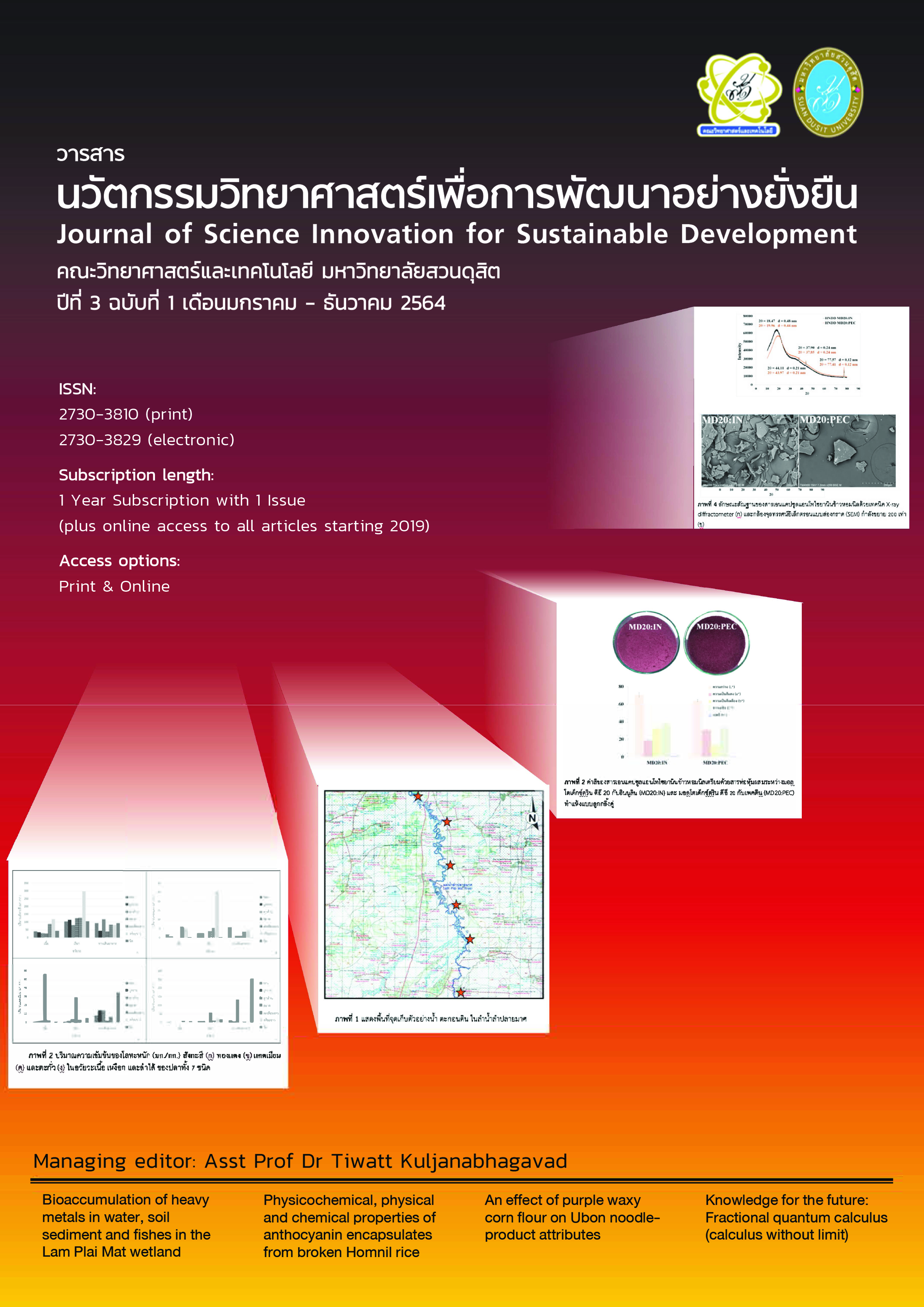การประยุกต์ใช้เทคโนโลยีดิจิทัลรองรับท่องเที่ยวเชิงสุขภาพสำหรับผู้สูงอายุวิถีปกติใหม่ จากสถานการณ์โควิด-19 ฐิติยา เนตรวงษ์* และ ปริศนา มั่นเภา
Main Article Content
บทคัดย่อ
บทความวิชาการนี้มีวัตถุประสงค์เพื่อ นำเสนอแนวคิดเทคโนโลยีดิจิทัลรองรับการท่องเที่ยวเชิงสุขภาพ ซึ่งภาคอุตสาหกรรมการท่องเที่ยวได้รับผลกระทบอย่างหนักจากสถานการณ์โควิด-19 ตลาดท่องเที่ยวปรับเปลี่ยนไปภายใต้วิถีปกติใหม่ จึงต้องหันมาใช้เทคโนโลยีดิจิทัลรองรับการบริการมากขึ้น นักท่องเที่ยวสูงวัยเป็นกลุ่มนักท่องเที่ยวที่มีศักยภาพในการใช้จ่ายสูง เป็นตลาดใหม่ที่มีศักยภาพสูงมากเนื่องจากเป็นตลาดที่มีคุณภาพ เน้นการท่องเที่ยวและบริการที่มีคุณภาพดี รูปแบบการท่องเที่ยวเชิงสุขภาพของไทยมี 2 รูปแบบ ได้แก่ 1) การท่องเที่ยวเชิงส่งเสริมเป็นวัตถุประสงค์หลักเพื่อมาดำรงรักษา ส่งเสริมสุขภาพโดยฉพาะ และ 2) การท่องเที่ยวเชิงส่งเสริมสุขภาพเป็นวัตถุประสงค์รอง โดยมีจุดมุ่งหมายเพื่อมาเที่ยวชมธรรมชาติ เที่ยวชมวัฒนธรรมอื่น ๆ ควบคู่กับการดูแลรักษาสุขภาพกายและสุขภาพจิต จากสถานการณ์โควิด-19 อุตสาหกรรมการท่องเที่ยวหลังจากนี้ จะต้องสร้างความเชื่อมั่นให้กับคนไทยในการเดินทางภายในประเทศไทยให้มากขึ้น โดยเน้นที่กลุ่มนักท่องเที่ยวคุณภาพ แม้จำนวนนักท่องเที่ยวจะลดลง แต่เพิ่มมูลค่าการใช้จ่ายต่อคนให้มากขึ้น คำนึงถึงความปลอดภัยและความยั่งยืนด้านสิ่งแวดล้อม เทคโนโลยีดิจิทัลถูกนำมาประยุกต์ใช้เพื่อรองรับกับการปรับตัวด้านพฤติกรรมการท่องเที่ยวสมัยใหม่ โดยนำมาใช้เพื่อการวางแผนการท่องเที่ยว การประกอบการตัดสินใจ การเพิ่มความรู้ด้านการรักษาสุขภาพ ซึ่งในปัจจุบันผู้สูงอายุได้หันมาสนใจในการใช้เทคโนโลยีมากขึ้น แต่การนำเทคโนโลยีดิจิทัลมาใช้เพื่อส่งเสริมการท่องเที่ยวเชิงสุขภาพสำหรับผู้สูงอายุต้องคำนึงถึงการเปลี่ยนแปลงทางด้านสมรรถนะทางร่างกาย ตรงกับความต้องการในเนื้อหาที่เป็นการส่งเสริมสุขภาพอันเป็นประโยชน์และง่ายต่อการใช้งานกับผู้สูงอายุ
Article Details

อนุญาตภายใต้เงื่อนไข Creative Commons Attribution-NonCommercial-NoDerivatives 4.0 International License.
ลิขสิทธิ์ต้นฉบับที่ได้รับการตีพิมพ์ในวารสารนวัตกรรมวิทยาศาสตร์เพื่อการพัฒนาอย่างยั่งยืนถือเป็นกรรมสิทธิ์ของคณะวิทยาศาสตร์และเทคโนโลยี มหาวิทยาลัยสวนดุสิต ห้ามผู้ใดนำข้อความทั้งหมดหรือบางส่วนไปพิมพ์ซ้ำ เว้นแต่จะได้รับอนุญาตอย่างเป็นลายลักษณ์อักษรจากคณะวิทยาศาสตร์และเทคโนโลยี มหาวิทยาลัยสวนดุสิต นอกจากนี้ เนื้อหาที่ปรากฎในบทความเป็นความรับผิดชอบของผู้เขียน ทั้งนี้ไม่รวมความผิดพลาดอันเกิดจากเทคนิคการพิมพ์
เอกสารอ้างอิง
กระทรวงการท่องเที่ยวและกีฬา. (2554). สถิติด้านการท่องเที่ยว ปี 2554. [ออนไลน์]. สืบค้นเมื่อ กุมภาพันธ์ 23, 2562, จาก https://www.mots.go.th/more_news.php?cid=509&filename=index
การท่องเที่ยวแห่งประเทศไทย ททท. (2564). Amazing Thailand. [ออนไลน์]. สืบค้นเมื่อ กุมภาพันธ์ 5, 2564, จาก https://thai.tourismthailand.org/home
ข่าวสารสุขภาพ. (2563). เปิดแผนท่องเที่ยวเชิงสุขภาพรูปแบบใหม่ เน้นวิถีถิ่น กระตุ้นเศรษฐกิจหลังวิกฤตโควิด.สืบค้นเมื่อ กุมภาพันธ์ 5, 2564, จาก https://healthserv.net/6663
เฉลิมพงษ์ ลินลา. (2558). ปัจจัยที่ส่งผลต่อการเลือกใช้แอปพลิเคชับนสมาร์ทโฟนและแท็บเล็ตของผู้สูงอายุในเขตกรุงเทพมหานคร. การค้นคว้าอิสระปริญญาบริหารธุรกิจมหาบัณฑิต คณะบริหารธุรกิจ มหาวิทยาลัยเทคโนโลยีราชมงคลธัญบุรี.
ณภัทร ญาโสภาส. (2564). นวัตกรรมการท่องเที่ยวยุคดิจิทัล. [ออนไลน์]. สืบค้นเมื่อ กุมภาพันธ์ 5, 2564, จาก https://so03.tci-thaijo.org/index.php/KRUjournal/article/download/132334/135097/
ทิพยา จินตโกวิท และศจีมาจ ณ วิเชียร. (2562). แนวทางการออกแบบเว็บไซต์ด้านสุขภาพสำหรับผู้สูงอายุ. วารสารวิชาการครุศาสตรอุตสาหกรรม พระจอมเกล้าพระนครเหนือ, 10(1): 217–226.
นฤมล อนุสนธิ์พัฒน์. (2563). การปรับตัวทางเศรษฐกิจด้านการท่องเที่ยวในสภาวะวิกฤตโควิด 19 (Coronavirus Disease 2019 (COVID-19) ในประเทศไทย. วารสารวิชาการมนุษยศาสตร์และสังคมศาสตร์, 8(1): 1–24.
พัชรภรณ์ สุนทรวิบูลย์. (2561). นวัตกรรมการสื่อสารกับอุตสาหกรรมการท่องเที่ยวยุคประเทศไทย 4.0. วารสารวิชาการนวัตกรรมสื่อสารสังคม, 6(2): 200–210.
พิมลอร ตันหัน. (2559). แนวทางการพัฒนาแอปพลิเคชันบนโทรศัทพ์มือถือสำหรับผู้สูงอายุ. วารสารวิชาการมหาวิทยาลัยออสเทิร์นเอเชีย, 10(3): 55–62.
มหาวิทยาลัยศรีปทุม. (2564). โอกาสการท่องเที่ยวประเทศไทยหลังโควิด หรือ เราควรเป็น Medical Health Tourism Hub ของภูมิภาค. [ออนไลน์]. สืบค้นเมื่อ กุมภาพันธ์ 5, 2564, จาก https://www.spu.ac.th/activities/26186.
มูลนิธิสถาบันวิจัยเพื่อการพัฒนาประเทศไทย. (2561). โครงการศึกษาการพัฒนากำลังคนด้านดิจิทัล (Digital Manpower) เพื่อรองรับอุตสาหกรรมเป้าหมาย (S-Curve) และการพัฒนาระเบียงเศรษฐกิจพิเศษภาคตะวันออก (Eastern Economic Corridor: EEC). สำนักงานส่งเสริมเศรษฐกิจดิจิทัล และมูลนิธิสถาบันวิจัยเพื่อการพัฒนาประเทศไทย.
ย่อโลกเศรษฐกิจ. (2563). เปิดโมเดล SEXY สร้างตลาดท่องเที่ยวไทยใหม่. [ออนไลน์]. สืบค้นเมื่อ กุมภาพันธ์ 5, 2564, จาก https://www.youtube.com/watch?v=ccu5hYMzt74.
ยุทธศาสตร์ชาติสำนักงาน ก.พ. (2562). ยุทธศาสตร์ชาติ 20 ปี (พ.ศ. 2560–2579). [ออนไลน์]. สืบค้นเมื่อ เมษายน 24, 2562, จาก https://www.ocsc.go.th/sites/default/files/attachment/page/99049.pdf.
รัตนา ปานเรียนแสน สมบัติ กาญจนกิจ และกิ่งกนก เสาวภาวงศ์. (2560). รูปแบบการพัฒนาประเทศไทยให้เป็นศูนย์กลางการท่องเที่ยวเชิงสุขภาพในเอเชีย. รายงานวิจัยฉบับสมบูรณ์. สำนักงานคณะกรรมการวิจัยแห่งชาติ (วช.) และสำนักงานกองทุนสนับสนุนการวิจัย (สกว.).
วิชญ์พล เกตุชัยโกศล. (2559). การศึกษาขนาดของปุ่มที่เหมาะสมในโมบายแอพพลิเคชั่นสำหรับผู้สูงอายุ. รายงานวิจัยมหาวิทยาลัยกรุงเทพ.
วิภาวดี ลี้มิ่งสวัสดิ์ นพรัตน์ ศุทธิถกล และเกษวดี พุทธภูมิพิทักษ์. (2560). ศักยภาพและจุดเด่นของแหล่งท่องเที่ยวเชิงสุขภาพในภูมิภาคต่าง ๆ ของประเทศไทย และกลุ่มประเทศที่มีความโดดเด่นในการท่องเที่ยวเชิงสุขภาพในเอเชีย. รายงานวิจัยฉบับสมบูรณ์. สำนักงานคณะกรรมการวิจัยแห่งชาติ (วช.) และสำนักงานกองทุนสนับสนุนการวิจัย (สกว.).
วิเชียร ชุติมาสกุล และคณะ. (2557). การวิจัยเพื่อการวางรากฐานและพัฒนาระบบอิเล็กทรอนิกส์เพื่อส่งเสริมคุณภาพชีวิตในสังคมผู้สูงอายุ. รายงานวิจัย. มหาวิทยาลัยเทคโนโลยีพระจอมเกล้าธนบุรี.
วุฒิชาติ สุนทรสมัย และปิยะพร ธรรมชาติ. (2559). รูปแบบการท่องเที่ยวชุมชนเชิงสุขภาพของจังหวัดปราจีนบุรีเพื่อการพัฒนาเครือข่ายวิสาหกิจชุมชนอย่างยั่งยืน. [ออนไลน์]. สืบค้นเมื่อ มีนาคม 24, 2562, จาก https://www.kmutt.ac.th/jif/public_html/article_detail.php?ArticleID=183343
ศูนย์ปฏิบัติการภาวะฉุกเฉินทางสาธารณสุข. (2563). มาตรการด้านการท่องเที่ยวยุค New Normal. [ออนไลน์]. สืบค้นเมื่อ ธันวาคม 20, 2563, จาก https://www.skho.moph.go.th/eoc/?p=3239
สถาบันทรัพย์สินทางปัญญาแห่งจุฬาลงกรณ์มหาวิทยาลัย. (2560). รายงานการวิเคราะห์แนวโน้มเทคโนโลยีและอุตสาหกรรม อุตาสาหกรรมการท่องเที่ยวกลุ่มรายได้ดี และท่องเที่ยวเชิงสุขภาพ. กรุงเทพฯ: สถาบันทรัพย์สินทางปัญญาแห่งจุฬาลงกรณ์มหาวิทยาลัย.
สมบัติ กาญจนกิจ สุจิตรา สุคนธทรัพย์ เรณุมาศ มาอุ่น วิภาวดี ลี้มิ่งสวัสดิ์ และรัตนา ปานเรียนแสน. (2560). ศักยภาพอุตสาหกรรมการท่องเที่ยวเชิงสุขภาพของไทยเพื่อเป็นศูนย์กลางการท่องเที่ยวเชิงสุขภาพในเอเชีย. รายงานวิจัยฉบับสมบูรณ์. สำนักงานคณะกรรมการวิจัยแห่งชาติ (วช.) และสำนักงานกองทุนสนับสนุนการวิจัย (สกว.).
สุธิรา จันทร์ปุ่ม พิเชนทร์ จันทร์ปุ่ม และแพรตะวัน จารุตัน. (2560). การพัฒนาโมบายแอปพลิเคชั่นแหล่งท่องเที่ยวในจังหวัดสกลนครบนระบบปฏิบัติการแอนดรอย์. [ออนไลน์]. สืบค้นเมื่อ มีนาคม 24, 2562, จาก https://www.tci-thaijo.org/index.php/itmjournal/article/download/115344/89148/
เส้นทางเศรษฐีออนไลน์. (2563). ผ่าทางตันหลังโควิด! เร่งผลักดันไทยเข้าสู่ “เมืองท่องเที่ยวเชิงสุขภาพของโลก”. [ออนไลน์]. สืบค้นเมื่อ กุมภาพันธ์ 5, 2564, จาก https://www.sentangsedtee.com/today-news/article_156595
สำนักข่าวนิวส์พลัส. (2563). หลังโควิดเปลี่ยนวิกฤติเป็นโอกาส ชูเน้นท่องเที่ยวเชิงสุขภาพ วัฒนธรรมและอาหาร ดึงนักท่องเที่ยวไฮเอนด์ฯ. [ออนไลน์]. สืบค้นเมื่อ กุมภาพันธ์ 5, 2564, จาก https://stock.newsplus.co.th/192628
สำนักงานพัฒนาสังคมและความมั่นคงของมนุษย์ จังหวัดสุพรรณบุรี. (2563). สถานการณ์ผู้สูงอายุจังหวัดสุพรรณบุรี. [ออนไลน์]. สืบค้นเมื่อ มีนาคม 3, 2562, จาก http://nadt.or.th/pages/stat61.html/แอปพลิเคชันวัดอรุณราชวราราม. (2564). [ออนไลน์]. สืบค้นเมื่อ กุมภาพันธ์ 5, 2564, จาก https://360.kaenkaewontour.com/watarun
โอกาสจากนักท่องเที่ยววัยเก๋า. (2560). [ออนไลน์]. สืบค้นเมื่อ มีนาคม 20, 2562, จาก https://positioningmag.com/?p=1112868
Jungprawate, P., Suansri, M. Suansri, S., & Ketmuni, M. (2021). Factors Affecting Health Tourism Promotion for the Elderly in Nakhon Nayok Province, Thailand. Turkish Journal of Computer and Mathematics Education, 11(8), 2718–2724.
Krungthai COMPASS. (2563). เจาะพฤติกรรมท่องเที่ยวใน New Normal เมื่อโควิดทำชีวิตเปลี่ยน. [ออนไลน์]. สืบค้นเมื่อ กุมภาพันธ์ 5, 2564, จาก https://krungthai.com/Download/economyresources/EconomyResourcesDownload_450เจาะพฤติกรรมท่องเที่ยวใน_New_Normal_เมื่อโควิดทำชีวิตเปลี่ยน_31_08_63.pdf
KUNSTMATRIX. (2021). [Online]. Retrieved November 15, 2021, from Art EdTech Chula - 3D virtual exhibition by EDU CHULA | art.spaces | KUNSTMATRIX.
Liu, Q., Wang, Y., Tang, Q., & Liu, Z. (2020). Do You Feel the Same as I Do? Differences in Virtual Reality Technology Experience and Acceptance Between Elderly Adults and College Students. Front. Psychol, 11, 573673. doi: 10.3389/fpsyg.2020.573673.
MCOT COVID CENTER. (2563). ท่องเที่ยวในวิถี New Normal. [ออนไลน์]. สืบค้นเมื่อ ธันวาคม 20, 2563, จาก https://covid19.mcot.net/knowledge_covid/ท่องเที่ยวในวิถี-new-normal/
Nemirschi, A. & Vancea, D. P. C. (2020). Industry Redesign Directions in the Context of the COVID-19 Pandemic. “Ovidius” University Annals. Economic Sciences Series, XX(2), 418–423.
Nikou, S., Agahari, W., Keijzer-Broers, W., & Reuver, M. (2019). Digital healthcare technology adoption by elderly people: A capability approach model. Telematics and Informatics, https://doi.org/10.1016/j.tele.2019.101315.
Ribeiro, F. R., Silva, A., Barbosa, F., Silva, A. P. Metrôlho, J. C. (2018). Mobile applications for accessible tourism: overview, challenges and a proposed platform. Inf Technol Tourism, 19, 29–59. https://doi.org/10.1007/s40558-018-0110-2.
Setsri, P. (2017). The Pattern of Elderly Health Tourism in Bangkok, Thailand. International Journal of Social Science and Humanity, 7(2), 72–75. doi: 10.18178/ijssh.2017.7.2.798.
Spatial. (2021). [Online]. Retrieved November 15, 2021, from Spatial - Virtual Spaces That Bring Us Together.
Sun, X., Yan, W., Zhou, H., Wang, Z., Zhang, X., Huang, S., & Li, L. (2020). Internet use and need for digital health technology among the elderly: a cross sectional survey in China. BMP Public Health, 20,1386. https://doi.org/10.1186/s12889-020-09448-0.
World Economic Forum. (2020). The Future of Jobs Report 2020. Geneva: World Economic Forum.


